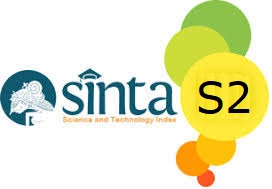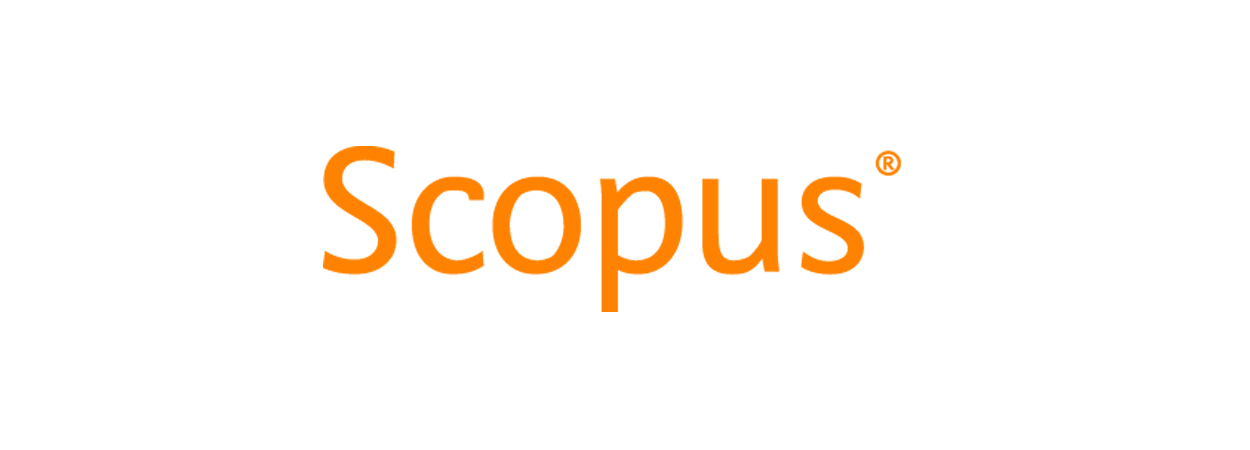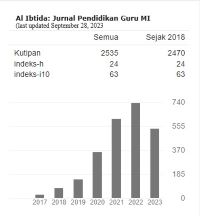Developing Edutainment-Based Comic Media in Integrative-Thematic Learning in the Elementary School
(1) Universitas Negeri Yogyakarta
(2) Universitas Negeri Yogyakarta
(*) Corresponding Author
Abstract
Abstract
The aim of this research is to develop edutainment-based comic media in thematic-integrative learning in fifth grade of elementary school. This study is a Research and Development (R&D) using the Borg and Gall model. The data were obtained through observation, interviews, and questionnaires. The results of comic media were obtained through a media expert product evaluation questionnaire and material from experts, educational practitioners, and peers. While the trial results were obtained through a questionnaire response given to 72 fifth grade elementary school students. The results of the validators indicate that the comic media is very feasible to be seen from the aspect of the media with an average is 92,27%, it is also considered very feasible from the aspect of the material with an average is 91,63%. Validation results with education practitioners get an average of 81,5% and 87,82% for peers with the criteria very good. The results of small class trial get an average is 84,72% and large class trial get an average of 91,6% with very good criteria. It also obtained an average is 91,6% from the teachers’ response questionnaire with criteria very good. Based on the results, the edutainment-based comic media is very feasible for SD/MI teacher to be used in integrative thematic learning. Most students believed that comics contribute to facilitate understanding of the concept of the material and provide fun for students in reading.
Keywords: comic media, edutainment, integrative-thematic learning.Â
Â
Abstrak
Penelitian ini bertujuan untuk mengembangkan media komik berbasis edutainment dalam pembelajaran tematik-integratif di kelas V Sekolah Dasar. Penelitian ini merupakan penelitian pengembangan dengan menggunakan model Borg and Gall. Data penelitian ini diperoleh melalui observasi, wawancara, dan angket. Hasil kelayakan media komik berbasis edutainment diperoleh melalui angket penilaian produk ahli media dan ahli materi, guru kelas, dan teman sejawat. Sedangkan hasil uji coba diperoleh melalui angket respon yang diberikan kepada 72 siswa kelas V SD. Hasil validasi ahli menunjukkan bahwa media komik berbasis edutainment sangat layak dilihat dari aspek media dengan rata-rata 92,27% dan aspek materi dengan rata-rata 91,63%. Hasil validasi oleh praktisi pendidikan mendapatkan rata-rata 81,5% dan penilaian teman sejawat mendapatkan rata-rata 87,82% dengan kriteria sangat baik. Hasil uji coba kelas kecil mendapatkan rata-rata 84,72% dan uji coba kelas besar memperoleh rata-rata 91,6% dengan kriteria sangat baik. Guru juga merespon sangat baik terhadap media komik berbasis edutainment dengan memperoleh rata-rata 91.6%. Sehingga dapat disimpulkan bahwa media komik berbasis edutainment sangat layak digunakan dalam pembelajaran tematik-integratif di sekolah dasar. Banyak siswa yang meyakini bahwa komik mampu memfasilitasi pemahaman konsep materi dan memberikan kesenangan dalam membaca.
Kata kunci: media komik, edutainment, pembelajaran tematik-integratif.
Full Text:
PDFReferences
Anggarniastiti, T., Rosana, D., & Setianingsih, W. (2017). the Development of Science Learning Device Based on Science Edutainment To Improve Student’S Learning Motivation and Cognitive Learning Achievement. Journal of Science Education Research, 1(1), 6–9. https://doi.org/10.21831/jser.v1i1.16183
Anggraheni, N. S., Hidayah, N., & Shawmi, A. N. (2019). Developing Red-White Monopoly Games through Integrative Thematic Learning in the Primary School. Al Ibtida: Jurnal Pendidikan Guru MI, 6(1), 49. https://doi.org/10.24235/al.ibtida.snj.v6i1.3834
Ardani, R. A., & Setyaningrum, W. (2018, September). Game-Based Edutainment Media using Guided Discovery Approach: What teachers say?.Journal of Physics: Conference Series, 1097(1), 1–9. https://doi.org/10.1088/1742-6596/1097/1/012101
Azman, F. N., Zaibon, S. B., & Shiratuddin, N. (2014). Exploring Digital Comics as an Edutainment Tool : An Overview. Knowledge Management International Conference 2014 (KMICe2014), 12-15 August 2014, Langkawi, Malaysia.
Berman, E. T., Wiyono, A., Zakaria, A., & Supriatno, S. (2019). Enhancing of Student Competency in Psychrometric Subjects Using the Edutainment Method. Advances in Social Science, Education and Humanities Research, 214, 54–58. https://doi.org/10.2991/ices-18.2019.14
Borg, W. R., & Gall, M. D. (1983). Educational Research An Introduction. New York: Longman.
Budiarti, W. N., & Haryanto, H. (2016). Pengembangan Media Komik Untuk Meningkatkan Motivasi Belajar Dan Keterampilan Membaca Pemahaman Siswa Kelas Iv. Jurnal Prima Edukasia, 4(2), 233. https://doi.org/10.21831/jpe.v4i2.6295
Cho, H. (2012). The Use Cartoons as Teaching a Tool in Middle School Mathematics. Seoul: ProQuest, UMI Dissertation Publishing.
Cirigliano, M. M. (2012). Exploring the Attitudes of Students Using an Edutainment Graphic Novel as a Supplement to Learning in the Classroom. Science Educator, 21(1), 29–36.
Dallacqua, A. K. (2020). Reading Comics Collaboratively and Challenging Literacy Norms. Literacy Research and Instruction, 59(2), 169–190. https://doi.org/10.1080/19388071.2019.1669746
Dallacqua, A. K., & Peralta, L. R. (2019). Reading and (Re)writing Science Comics: A Study of Informational Texts. Reading Teacher, 73(1), 111–118. https://doi.org/10.1002/trtr.1801
Enteria, O., & Casumpang, P. F. H. (2019). The Effectiveness of Developed Comic Strips as Intructional Materials in Teaching Specific Science Concepts. International Journal for Innovation Education and Research, 7(10), 876–882. https://doi.org/10.31686/ijier.vol7.iss10.1835
Handayani, M. (2018). Developing Thematic-Integrative Learning Module with Problem-Based Learning Model for Elementary School Students. Jurnal Prima Edukasia, 6(2), 166–176. https://doi.org/10.21831/jpe.v6i2.14288
Hidayat, N., & Rostikawati, T. (2018). The Effect of the Scientific Approach with Comic Intelligent Media Support on Students ’ Science Competencies. Journal of Educational Review and Research, 1(1), 38–50. https://doi.org/http://dx.doi.org/10.26737/jerr.v1i1.507
Hwang, G. J., Yang, L. H., & Wang, S. Y. (2013). A Concept Map-Embedded Educational Computer Game for Improving Students’ Learning Performance in Natural Science Courses. Computers and Education, 69, 121–130. https://doi.org/10.1016/j.compedu.2013.07.008
Indaryati, I., & Jailani, J. (2015). Pengembangan Media Komik Pembelajaran Matematika Meningkatkan Motivasi dan Prestasi Belajar Siswa Kelas V. Jurnal Prima Edukasia, 3(1), 84–96. https://doi.org/10.21831/JPE.V3I1.4067
Isa, W. M. W., Amin, M. A. M., Rozaimee, A., Idris, W. M. R. W., Rahim, N., & Samaden, I. S. (2015). Conceptual framework of edutainment animated series for children: A pious story. ARPN Journal of Engineering and Applied Sciences, 10(3), 1106–1113.
Jee, B. D., & Anggoro, F. K. (2012). Comic Cognition: Exploring the Potential Cognitive Impacts of Science Comics. Journal of Cognitive Education and Psychology, 11(2), 196–208. https://doi.org/10.1891/1945-8959.11.2.196
Kim, J., Chung, M. S., Jang, H. G., & Chung, B. S. (2017). The use of educational comics in learning anatomy among multiple student groups. Anatomical Sciences Education, 10(1), 79–86. https://doi.org/10.1002/ase.1619
Kurniawati, A. A., Wahyuni, S., & Putra, P. D. A. (2017). Utilizing of comic and Jember’s local wisdom as integrated science learning materials. International Journal of Social Science and Humanity, 7(1), 47–50. https://doi.org/10.18178/ijssh.2017.7.1.793
Lin, S. F., Lin, H. shyang, Lee, L., & Yore, L. D. (2015). Are Science Comics a Good Medium for Science Communication? The Case for Public Learning of Nanotechnology. International Journal of Science Education, Part B: Communication and Public Engagement, 5(3), 276–294. https://doi.org/10.1080/21548455.2014.941040
Morrison, T. G., Bryan, G., & Chilcoat, G. W. (2002). Using student-generated comic books in the classroom. Journal of Adolescent and Adult Literacy, 45(8), 758–767. https://doi.org/10.2307/40012828
Munawwaroh, E. L., Priyono, B., & Ningsih, M. R. (2018). The Influence of Science Comic Based Character Education on Understanding the Concept and Students’ Environmental Caring Attitude on Global Warming Material. Journal of Biology Education, 7(2), 167–173. https://doi.org/10.15294/jbe.v7i2.24257
Muzumdar, J. (2016). An Overview of Comic Books as an Educational Tool and Implications for Pharmacy. INNOVATIONS in Pharmacy, 7(4), 1–10. https://doi.org/10.24926/iip.v7i4.463
Nugraheni, N. (2017). Penerapan Media Komik Pada Pembelajaran Matematika Di Sekolah Dasar. Refleksi Edukatika : Jurnal Ilmiah Kependidikan, 7(2), 111–117. https://doi.org/10.24176/re.v7i2.1587
Özdemir, Ertuğrul. (2017). Humor in elementary science: development and evaluation of comic strips about sound. International Electronic Journal of Elementary Education, 9(4), 837–850.
Özdemir, Ertugrul, & Eryilmaz, A. (2019). Comics in Science Teaching: A Case of Speech Balloon Completing Activity for Heat Related Concepts. Journal of Inquiry Based Activities (JIBA), 9(1), 37–51.
Putra, C. A. (2018). Enhanced Learning Outcomes Using Interactive Edutainment Learning Method. Proceedings International Conference Bksptis 2018, 0(0), 219–224. Retrieved from http://jurnal.unissula.ac.id/index.php/bksptis/article/view/3576/2614
Rahayu, M. S. I., & Kuswanto, H. (2020). Development of android-based comics integrated with scientific approach in physics learning. Journal of Physics: Conference Series, 1440(1). https://doi.org/10.1088/1742-6596/1440/1/012040
Resti, K. Y., & Alizamar. (2019). Kreativitas Guru dalam Meningkatkan Hasil Belajar Siswa pada Pembelajaran Tematik Terpadu Kurikulum 2013 di Madrasah Ibtidaiyah Negeri Bayang Pesisir Selatan. Jurnal Basicedu, 3(2), 591–597. https://doi.org/https://doi.org/10.31004/basicedu.v3i2.43
Rosyida, A., Mustaji, M., & Subroto, W. (2018). The Development of Contextual Teaching and Learn-ing-Based Comic as a Learning Media for Elementary School Students. Advances in Social Science, Education and Humanities Research, 173(Icei 2017), 13–16. https://doi.org/10.2991/icei-17.2018.4
Sanaky, A. . (2013). Media Pembelajaran Interaktif-Inovatif. Yogyakarta: Kaukaban Dipantara.
Santrock, J. (2013). Life-Span Development (14th Editi). New York: McGraw-Hill Companies, Inc.
Saputro, H., & Soeharto, S. (2015). Pengembangan Media Komik Berbasis Pendidikan Karakter pada Pembelajaran Tematik-Integratif Kelas IV SD. Jurnal Prima Edukasia, 3(1), 61–72. https://doi.org/10.1016/S0002-9378(15)30176-9
Shiang, R.-F. (2018). Embodied EFL Reading Activity: Let’s Produce Comics. Reading in a Foreign Language, 30(1), 108–129.
Toh, Tin, L., Cheng, L. P., Ho, S. Y., Jiang, H., & Lim, K. M. (2017). Use of comics to enhance students’ learning for the development of the twenty-first century competencies in the mathematics classroom. Asia Pacific Journal of Education, 37(4), 437–452. https://doi.org/10.1080/02188791.2017.1339344
Vulte, M. J. (2013). Comic Books and Other Hooks: 21st Century Education. Bloomington: Author House.
Widyawati, A., & Prodjosantoso, A. K. (2015). Pengembangan Media Komik Ipa Untuk Meningkatkan Motivasi Belajar Dan Karakter Peserta Didik Smp. Jurnal Inovasi Pendidikan IPA, 1(1), 24–35. https://doi.org/10.21831/jipi.v1i1.4529
Zagkotas, V. (2019). Are comic books appropriate for teaching History? Three suggestions for Greek Primary Education. Education 3-13, 47(3), 358–365. https://doi.org/10.1080/03004279.2018.1452955.
DOI: 10.24235/al.ibtida.snj.v7i2.6676
Article Metrics
Abstract view : 75 timesPDF - 12 times
Refbacks
Copyright (c) 2022 Al Ibtida: Jurnal Pendidikan Guru MI

This work is licensed under a Creative Commons Attribution 4.0 International License.
Al Ibtida: Jurnal Pendidikan Guru MI Indexed by:
Editorial Office:
FITK Building, 5th Floor, Department of Madrasah Ibtidaiyah Teacher Education, Faculty of Tarbiyah and Teacher Training, UIN Siber Syekh Nurjati Cirebon. Perjuangan Street of Sunyaragi, Cirebon City, West Java, Indonesia 45132. Phone. 0231-481264, Fax. 0231-489926, Email: alibtida@syekhnurjati.ac.id
Al Ibtida: Jurnal Pendidikan Guru MI is licensed under a Creative Commons Attribution 4.0 International License.



















